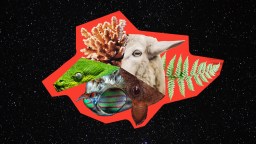planets
A study of europium crystals shows the planet was mostly flat during its middle ages.
A new study found the possible reason why some dwarf galaxies appear to not have dark matter.
Radar astronomy is nothing new, but a new transmitter may give us unprecedented image resolution.
Researchers discover strange behavior in magnetars, ultra-powerful magnetic stars.
A new study analyzed Martian glaciers to discover that the planet had numerous ice ages.
Identifying primordial ripples would be key to understanding the conditions of the early universe.
A unique exoplanet without clouds or haze was found by astrophysicists from Harvard and Smithsonian.
What lies in store for humanity? Theoretical physicist Michio Kaku explains how different life will be for your descendants—and maybe your future self, if the timing works out.
▸
15 min
—
with
The search for alien life is far too human-centric. Our flawed understanding of what life really is may be holding us back from important discoveries about the universe and ourselves.
▸
6 min
—
with
Planets can emit radio waves. For the first time, we’ve picked them up from outside the solar system.
Scientists find routes using arches of chaos that can lead to much faster space travel.
Puerto Rico’s iconic telescope facilitated important scientific discoveries while inspiring young scientists and the public imagination.
Zircons in a Martian meteorite widens the possible timeframe for life on Mars.
A team of astrophysicists used AI to figure out which clusters of stars merged to become our galaxy.
Using a laboratory model, scientists get a nice Jovian surprise.
The Earth is not flat. Here’s how you can prove it.
A new study from NASA and the SETI Institute comes up with an exciting number of potentially life-supporting planets.
A meteorite that smashed into a frozen lake in Michigan may explain the origins of life on Earth, finds study.
Researchers find a key clue to the evolution of bony fish and tetrapods.
Want some crazy space phenomena? You don’t have to leave the neighborhood for it.
New research explains why the Moon’s crust is magnetized by debunking one long-standing theory.
The solar system has some strange stuff in it. Learning how it ended up that way can tell us where we’re going.
The study identified superhabitable planets outside of our solar system.
Researchers detect a large lake and several ponds deep under the ice of the Martian South Pole.
Astronomers spot an object heading into Earth orbit.
Astronomers propose a new location for the mysterious force that accelerates the universe.
A new study shows bacteria could survive travel from Earth to Mars.
Firsthand accounts of what it’s really like to go to and come back from space.
▸
14 min
—
with
Math doesn’t suck. It is one of humanity’s greatest and most mysterious journeys.
▸
15 min
—
with
A new study discovers how blazars shoot out jets of radiation towards Earth.





























